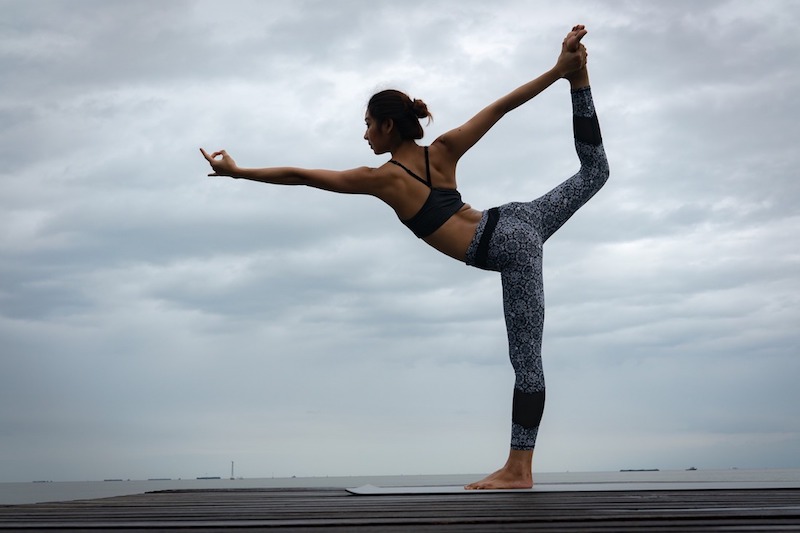If you practice yoga regularly, you probably already know how calm and balanced you feel after class. But for people with depression, yoga can have an even more profound impact on their mental health, suggests new research. In turn, this can help them stay physically active, which provides an additional mood boost.
“Moderate” Effect of Yoga for Depression
In a paper published May 18 in the British Journal of Sports Medicine, Australian researchers reviewed 13 previous studies which looked at the benefits of yoga for depression.
Unlike earlier reviews, which focused on people diagnosed with depression, the new paper also included studies looking at whether yoga could reduce depressive symptoms in people with another mental illness.
Researchers combined the data from these studies, in what’s called a meta-analysis. Together, these studies included 578 participants who were assigned to a yoga intervention, with another 502 participants assigned to a non-yoga comparison group known as a control group.
The yoga interventions lasted from 1.5 to 2.5 months, with one to three yoga sessions per week. The sessions ranged from 20 to 90 minutes long.
Several types of yoga were used in these studies — hatha, vinyasa, SVYASA (Swami Vivekananda Yoga Anusandhana Samsthana), kundalini and Kripalu. In most of the studies, participants took part in a yoga class taught by a yoga teacher. In two of the studies, participants practiced on their own at home.
Overall, people who did yoga saw a “moderate” improvement in their depressive symptoms, compared to those who didn’t do yoga.
These benefits occurred in people diagnosed with depression or schizophrenia. People with post-traumatic stress disorder (PTSD) didn’t see any reduction in their depressive symptoms. There was a small improvement in people with alcohol use disorder, but this change wasn’t statistically significant.
The researchers also found that people who did yoga more frequently during the week saw greater improvement in their depressive symptoms. This suggests that regular yoga practice — even if shorter sessions — may offer greater benefits than the occasional longer yoga class.
“Interventions should aim to increase the frequency of [participants’] sessions per week, as opposed to the duration of each session or the overall duration of the intervention,” wrote the authors.
Other factors didn’t have an effect on depressive symptoms, such as the duration of the sessions, the length of the intervention, and whether people were supervised by a yoga teacher.
Dropout rates varied among the studies, with nine to 48 percent of people stopping the yoga intervention early.
Why Does Yoga Relieve Depressive Symptoms?
If you practice yoga, especially regularly, it’s easy to imagine how it might help someone with depression. But the mechanism for how yoga relieves symptoms of depression is not entirely clear.
Complicating matters, yoga is not just a physical activity, but can also include controlled breathing (pranayama), mindfulness, and meditation — although not all yoga classes have all of these elements.
The studies included in this review involved physically active yoga, which means students went through a series of yoga poses. This is the type of yoga that many people are familiar with.
However, an earlier review found that yoga which combined yoga poses with pranayama, meditation, or deep relaxation had a greater effect on depressive symptoms. Another review found similar benefits of yoga for pregnant women with depression.
This suggests that it is the mindfulness or meditation component of yoga that reduces depressive symptoms. Which is probably true. Other research has found that mindfulness-based therapy has a positive effect on anxiety and depression.
But physical activity has also been shown to reduce symptoms of depression, with bigger effects seen for moderate to vigorous aerobic exercise, and for supervised workouts or exercise classes.
Combining movement with mindfulness in a yoga class may provide even greater mental health benefits.
Although the new review showed a moderate benefit of yoga for depression, the authors of the paper wrote that more research is needed in order to understand what works best — meaning the type of yoga, intensity, yoga poses, and inclusion of breathing or mindfulness techniques.
They also pointed out that there was little information in the studies on how much training or experience teachers leading the yoga interventions had. These factors could have a big impact on the outcomes, especially when yoga teachers are working with people with depression or another mental illness.
“Additional training and upskilling in mental health first aid should be considered for any exercise professional or yoga practitioner delivering interventions for this population,” the authors wrote.








